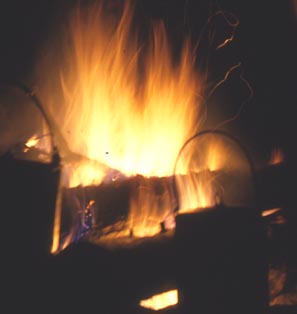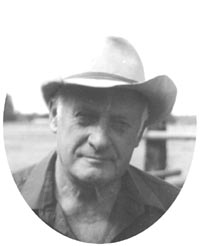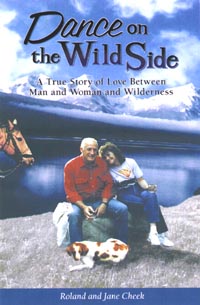a weblog sharing info on outdoor skills and campfire musing by a guy who spends a bunch of time in pursuit of both
CULTURE
WHERE -
TALES ARE TOLD OF
Welcome to Roland Cheek's Weblog
Roland is a gifted writer with a knack for clarifying reality. Looking forward to more of his wisdom
- Carl Hanner e-mail
C.L. Rawlins, writing in High Country News, once questioned our nation's commitment to retaining vestiges of our vast landscapes in its natural state:
One of the curious paradoxes of the American experience is that many of those who live in closest proximity to wilderness exhibit the greatest contempt for it.
And Wallace Stegner, Pulitzer Prize winning author, once wrote:
The Marriage of people to a place may be close and considerate, and it may be little more than sanctioned rape.
To access Roland's weblog and column archives
Tip o' the Day
There's a difference between grizzly bears and mountain lions. No, I'm not talking about their obvious physical properties; I'm referring to tactics appropriate in an encounter with each animal.
According to all the latest research, in a sudden encounter with a cougar (mountain lion), you can throw out much of what you've learned about responding to grizzly bears in similar situations.
If you discover a big cat in close proximity, never play dead; it's the worst thing you can do! Don't even so much as crouch. Instead, stand tall. Spread your jacket or shirt to appear larger--cougars can be intimidated by size.
Conversely, appearing larger to the fearless grizzly bear may make him feel threatened and trigger a violent reprisal. Playing dead with the same animal may, so it is said, lead the bear to conclude you pose no threat. Playing dead with a mountain lion, on the other hand, can lead the big cat to view you as a ready-made table delicacy.
Never turn you back on a cougar. They usually attack from the rear.
Do not jog alone in cougar country. There is evidence a cat's predatory instincts can be triggered by running humans who unwittingly mimic actions of the big felines' normal prey (several joggers have been attacked, each while jogging alone along isolated foothill roads and trails).
If you encounter a lion, all advisories tell you not to panic or make quick movements. Most tell you, also, to talk calmly to the cat, while backing slowly away.
Many of the same printed materials says never make direct eye contact; that "mountain lions may perceive eye contact as a threat." But I don't buy that one. Most info sheets will also tell you to avoid eye contact with a grizzly bear, and THAT I feel prudent--I don't want him to feel threatened. But if a cat can be threatened, and I already feel threatened, I want him to join the crowd.
I like the information released by the British Columbia Ministry of Environment: "If a cougar is advancing toward you, make a lot of noise by yelling and screaming. Use a club or stout stick to poke at him while continuing to make noise. Back away."
Everybody says "don't panic." One state advises you to "talk calmly" while one province advises "yelling and screaming." Of course, telling a person not to panic while a cougar is advancing with visions of pot roast is akin to saying,"don't get pimples." And advising one to talk calmly is probably appropriate advice for lion tamers, but hardly suitable for a computer programmer from New Jersey who's out for a day stroll in Glacier Park.
Yelling and screaming sounds like better advice; it sounds as if it's a pearl of wisdom I would find easy to follow. Was I lucky, it might even come out as something more than a whimper.
I have just finished The Phantom Ghost of Harriet Lou. Wow! It was wonderful! I was transported from my stateroom aboard a destroyer to the wilderness I roamed as a teenager. Your tales were well told, enlightening and dead on the money. The open ocean on a calm clear night is beautiful, but I'll never hear the hoarse bellow of a rutting bull. Driving a warship from the bridge into heavy seas and tailing green water is exhulting, but not nearly as much as stumbling across grizzly tracks that haven't begun to fill in. Thank you for sharing with me. My dad sent me the Thursday Great Falls Tribune, no matter where I am in the world for the last 13 years. I have always enjoyed your writing, but this book was special.
PROVINCIALISM'S CURSE
For a guy who spent most of his life tramping mountain trails, life on book tours is not always peaches and cream. While twiddling my thumbs behind a shopping mall table piled with titles I wrote--in which no one seems interested-- is when I'm apt to watch people. In the course of a couple of hours there can be hundreds of human features to peruse, perhaps thousands.
Each of them have ears, nose, eyes, lips, eyebrows, cheekbones, and chin. Yet no two are alike. Some are short, some tall, some fat, some thin. There are those who scowl and those with happy faces. Some are extroverts, some furtive. We humans are like snowflakes. No two people are structurally the same.
We're socially different, too. Maybe it once was north-south. But today, there's no difference that's more apparent than between easterner and westerner. I'm proud to be one and not the other. Out east, it's considered prudent not to look another in the eye. Is there a too-many-rats-in-the-cage syndrome at play here? Does failing to look someone in the eye help to avoid gutter slime? Where I hail from, if a man won't meet another's eye, everybody knows he's up to no good.
Corporations tend toward avoidance, too. As they grow and grow, they become less and less to their employees and their employees become less to them. At no time has that been more apparent than today, with 401(k)s and pension plans and medical benefit packages crashing as Wall Street says "excuse me, but we made a mistake."
I have a former railroad engineer friend employed by one of America's two gargantuan rail lines. My friend interestingly says about his employer: "There's no eye contact anymore."
My friend is referring, of course, to how far removed management is from where the work is done and how impossible it is for field personnel to communicate with the upper echelon. But I found his use of the "eye contact" metaphor to be instructive.
Provincialism can inhibit, too--west or east. I was once on the phone with a friend in Minneapolis, some 1,500 miles to the east, when an earthquake struck. It was a mild tremor, but the first I'd ever experienced. "My God!" I gasped as dishes began rattling in a China cabinet and the floor beneath where I stood did a two-step.
"What's wrong, Roland?" my friend asked.
"We . . . we're having an earthquake!"
"Aw, go on," he said. "I don't feel nothin'."
Provincialism narrows one's brain and tunnels the vision. Back in 1987, when I joined the outfit, the Outdoor Writers Association of America held their annual convention in Kalispell, Montana, a few miles from our home. One evening Jane and I sat across a banquet table from a charming couple from a large eastern city; the guy was the Outdoors Editor for a metropolitan newspaper. "We love your area," the lady gushed. "It's so beautiful." Jane smiled, I nodded. "But what do you people do here?"
I choked. "Beg your pardon?"
"What do you people do for entertainment?"
When Jane and I looked first at one another, then returned to stare in amazement, the lady felt obligated to explain:
"Where are your cultural amenities? Your symphony orchestras, your Shakespearean theaters? Neither do you boast major professional sports teams. Your shopping is limited, too, isn't it? Or have I not discovered the location of your outlet malls?"
I thought of all the wonders that God hath wrought--and placed specifically for our viewing pleasures: the towering mountains of Glacier National Park, the cirques, jewel-like lakes, pure-water rivers--all within an easy drive of where we sat at the moment. Or how about the half-dozen designated wilderness areas amid surrounding mountains? And the wildlife! The grizzly bears! The elk! The wolves! My God, woman, are you deaf, dumb, and blind?
But I didn't tell her.
Roland Cheek wrote a syndicated outdoors column (Wild Trails and Tall Tales) for 21 years. The column was carried in 17 daily and weekly newspapers in two states. In addition, he scripted and broadcast a daily radio show (Trails to Outdoor Adventure) that aired on 75 stations from the Atlantic seaboard to the Pacific Ocean. He's also written upwards of 200 magazine articles and 12 fiction and nonfiction books. For more on Roland, visit:
www.rolandcheek.com
Recent Weblogs
Tuesday, December 16, 2008
There's a bunch of specific info about Roland's books, columns, radio programs and archives. By clicking on the button to the left, one can see Roland's synopsis of each book, read reviews, and even access the first chapter of each of his titles. With Roland's books, there's no reason to buy a "pig in a poke."
for detailed info about each of Roland's books
Read Reviews
Read their first chapters
For interested educators, this weblog is especially applicable for use in history, science, and environmental classes, as well as for journalism students.
Roland, of course, visits schools. For more information on his program alternatives, go to:
NEXT WEEK:
PUTTING CHRIST IN CHRISTMAS
www.campfireculture.com
source links for additional info
to send this weblog to a friend
to tell Roland what you think of his Campfire Culture weblog
to visit Roland's newspaper columns and weblog archives
Just finished Dance On the Wild Side. It is a wonderful!!! book. Was unable to put it down until I finished it. Want a hardcover Bob Marshall book
In the wonderful, descriptive way Cheek aficionados have come to expect, he brings the bears and other wilderness denizens to life in the reader's imagination. The book is not a documentary. Neither is it a novel. Cheek has simply filled in the blanks with plausible storylines. The animals and events he describes arise from knowledge gained during a life in the mountains observing nature in general, but with concentration on elk and bears.
- Rural Montana
A friend recently loaned me a book to read, saying, "You and this man have a lot in common, and I think you will enjoy this book very much." I told her that I was already reading two books, and that it might be quite a while before I could get yours back to her. That evening I picked up your book My Best Work is Done at the Office, and I was reading it until 2:00 in the morning. I haven't touched my other books since! I just finished this and am about to start Chocolate Legs. My other books can wait. - H. Robert Krear / Estes Park, CO
- Frank Morgan / Willamina, OR
Roland's best selling book, in its 5th printing








